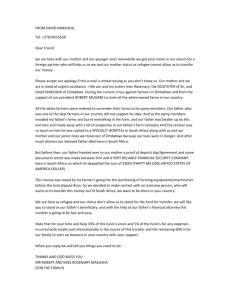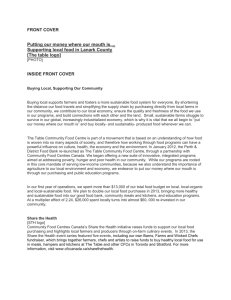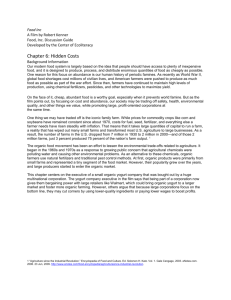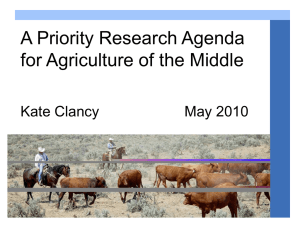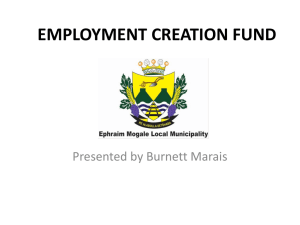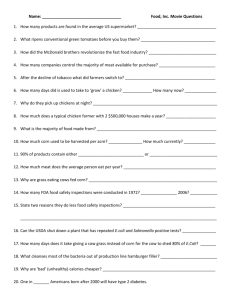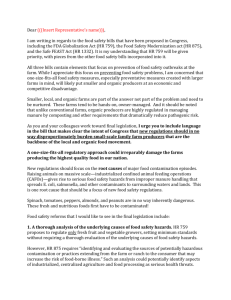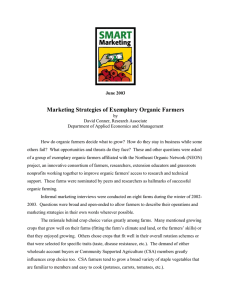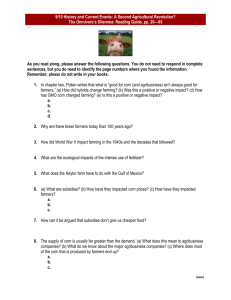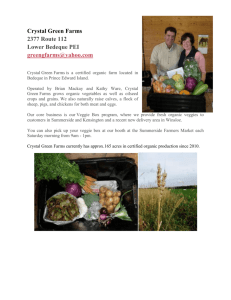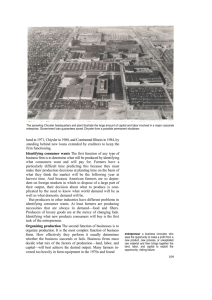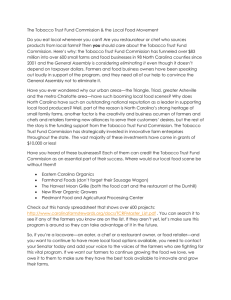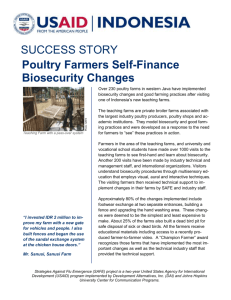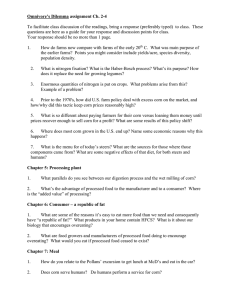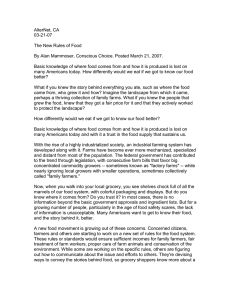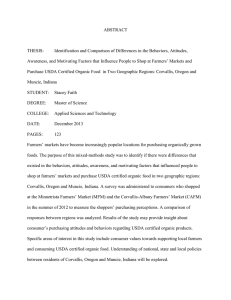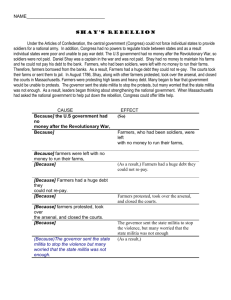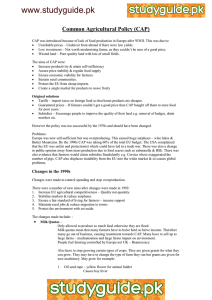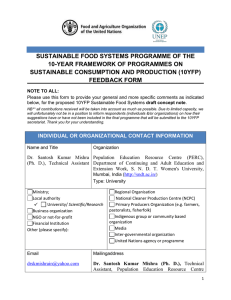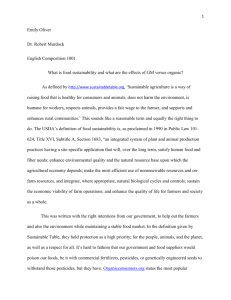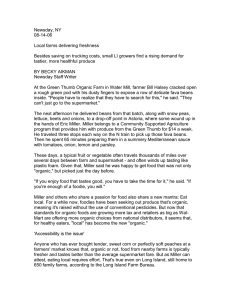Movie Sheet: Food Inc.
advertisement
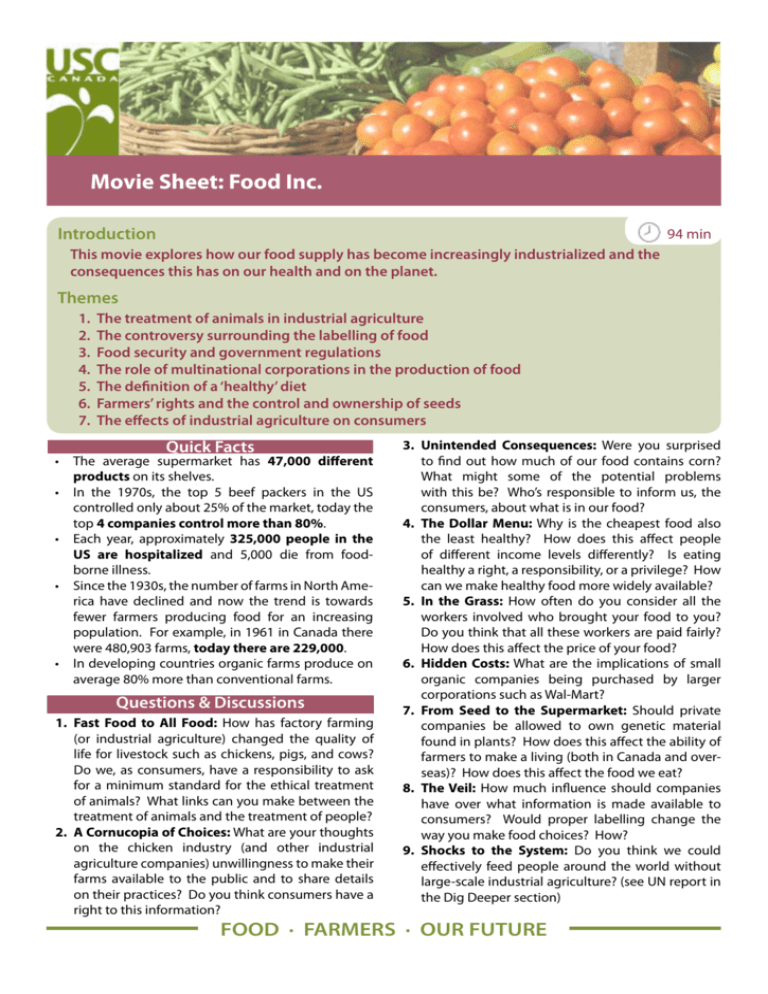
Movie Sheet: Food Inc. Introduction 94 min This movie explores how our food supply has become increasingly industrialized and the consequences this has on our health and on the planet. Themes 1. The treatment of animals in industrial agriculture 2. The controversy surrounding the labelling of food 3. Food security and government regulations 4. The role of multinational corporations in the production of food 5. The definition of a ‘healthy’ diet 6. Farmers’ rights and the control and ownership of seeds 7. The effects of industrial agriculture on consumers Quick Facts • The average supermarket has 47,000 different products on its shelves. • In the 1970s, the top 5 beef packers in the US controlled only about 25% of the market, today the top 4 companies control more than 80%. • Each year, approximately 325,000 people in the US are hospitalized and 5,000 die from foodborne illness. • Since the 1930s, the number of farms in North America have declined and now the trend is towards fewer farmers producing food for an increasing population. For example, in 1961 in Canada there were 480,903 farms, today there are 229,000. • In developing countries organic farms produce on average 80% more than conventional farms. Questions & Discussions 1. Fast Food to All Food: How has factory farming (or industrial agriculture) changed the quality of life for livestock such as chickens, pigs, and cows? Do we, as consumers, have a responsibility to ask for a minimum standard for the ethical treatment of animals? What links can you make between the treatment of animals and the treatment of people? 2. A Cornucopia of Choices: What are your thoughts on the chicken industry (and other industrial agriculture companies) unwillingness to make their farms available to the public and to share details on their practices? Do you think consumers have a right to this information? 3. Unintended Consequences: Were you surprised to find out how much of our food contains corn? What might some of the potential problems with this be? Who’s responsible to inform us, the consumers, about what is in our food? 4. The Dollar Menu: Why is the cheapest food also the least healthy? How does this affect people of different income levels differently? Is eating healthy a right, a responsibility, or a privilege? How can we make healthy food more widely available? 5. In the Grass: How often do you consider all the workers involved who brought your food to you? Do you think that all these workers are paid fairly? How does this affect the price of your food? 6. Hidden Costs: What are the implications of small organic companies being purchased by larger corporations such as Wal-Mart? 7. From Seed to the Supermarket: Should private companies be allowed to own genetic material found in plants? How does this affect the ability of farmers to make a living (both in Canada and overseas)? How does this affect the food we eat? 8. The Veil: How much influence should companies have over what information is made available to consumers? Would proper labelling change the way you make food choices? How? 9. Shocks to the System: Do you think we could effectively feed people around the world without large-scale industrial agriculture? (see UN report in the Dig Deeper section) FOOD ∙ FARMERS ∙ OUR FUTURE “The way we eat has changed more in the past 50 years, than in the previous 10,000. ” Dig Deeper Take Action 1.Know Your Food. • Find out what’s in your food. Read the labels and ask about where your food comes from. • “Vote with your fork” as author Micheal Pollan suggested in the film. Consider eating less meat; find companies that are committed to fair trade; and/or buy local seasonal food. • Buy directly from the farmer when possible, get to know him/her. Find out why they got into farming. What challenges does (s)he face? • Cook your own food. If you can’t already, learn to cook or learn a new recipe made with seasonal food. Make more healthy choices more often. • Give thanks. If you say grace, ask for food that keeps us, and the planet, healthy. 2.Go Further. • Research and donate to organizations that support small-scale farmers (USC-Canada, National Farmers Union, La Via Campesian, etc.) • Write to your MP, MPP or MLA, or the CEO of a food company about any of the issues brought up in the film (ie the ethical treament of animals, seed ownership by big businesses, food labels, etc.) • Discussion Guide – Developed by the Centre for Ecoliteracy for Food Inc. (available at www.foodincmovie.com – multimedia tab – educational materials – discussion guide). • “King Corn” - a documentary that tries to traces corn in our food supply (available at www.kingcorn. net or at www.youtube.com). • The Omnivore’s Dilemma: A Natural History of Four Meals - by Michael Pollan (2006) – an examination of the biological and economic story of the current food system. • The Way We Eat: Why our Food Choices Matter by Peter Singer and Jim Mason (2006) – a look at where the food of four American families orginates. • Proceedings from the International Convention on Organic Agriculture and Food Security - a UN Food and Agriculture Organization report that shows that organic can feed the world (available at http://www.fao.org/organicag/ofs/docs_en.htm). • “The Story of Food” - a short USC Canada film that shows what is wrong with our food system and what we can do to rebuild it (available at www.usccanada.org/storyoffood/). For more information, visit : http://usc-canada. org/resources/creative-campaigning/ 56 Sparks Street, Suite 705, Ottawa, Ontario, K1P 5B1 Tel: 613.234.6827 Fax:613.234.6842 www.usc-canada.org

